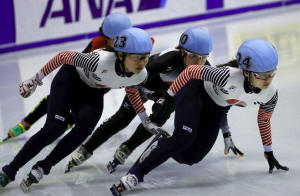|
Korea's gold medal hopes for Pyeongchang still on ice
 Send a link to a friend
Send a link to a friend
 [February 24, 2017]
By Peter Rutherford [February 24, 2017]
By Peter Rutherford
SEOUL (Reuters) - South Korea invested
heavily across the winter sports spectrum to boost its medal chances
at the 2018 Pyeongchang Olympics but if the ongoing Winter Asiad is
anything to go by, the cut-throat world of short track remains its
best hope for gold next year.
Since short track speed skating debuted as a medal sport at the 1992
Winter Olympics, Korean athletes have won 21 of the 48 golds up for
grabs, their bravery, blazing acceleration and ice-cool composure
giving them a razor-sharp edge over their rivals.
The Korean short track skaters have impressed at the Winter Asiad in
Sapporo, winning five of eight golds on offer, with two-time women's
overall world champion Choi Min-jeong and Sochi 3,000 meters relay
gold medalist Shim Suk-hee in top form.
A Korean Sports and Olympic Committee official said that while the
hosts hoped for medals across the board in 2018, short track
remained their bread and butter.
"Our gold medal targets will be focused on skating sports, with
short track as our strongest event and then speed skating," he said
on Friday.

"We have an overall target of eight gold, four silver and eight
bronze medals for Pyeongchang, but this may change."
South Korean speed skaters were also among the medals in Sapporo,
picking up six of the 14 golds. Lee Seung-hoon skated off with four
titles with his victories in the 5,000 and 10,000 meters, mass start
and team pursuit.
Perhaps a more realistic showing of Korea's global standing in the
sport, however, came at the World Single Distance Championships in
Gangneung earlier this month, a test event for the 2018 Games.
Korea won just one gold with Kim Bo-reum in the women's mass start,
while the dominant Dutch claimed eight titles.
REPLACING THE IRREPLACEABLE
While short track and speed skating account for all but one of South
Korea's 26 Winter Games gold medals, it is the other Olympic title
which truly revved up the country's passion for winter sports.
Figure skater Kim Yuna's captivating performance in Vancouver
brought the country to a standstill seven years ago and gave rise to
a new generation of skaters, skiers and sliders.
[to top of second column] |

South Korea's Shim Suk-hee (L) and South Korea's Choi Min-jeong (R)
in action during final. Picture taken on February 22, 2017.
REUTERS/Kim Kyung-Hoon

Her retirement after the 2014 Sochi Games saw Korea
bid farewell to one of its few global sporting personalities but
there is hope that one of her proteges, or 'Yuna Kids' as they have
been dubbed, will be able to step into her skates one day.
Replacing the irreplaceable Yuna is perhaps a forlorn hope, but Choi
Da-bin's performance in winning the women's short program in Sapporo
on Thursday proved South Korean figure skating appears to have a
future.
There are no sliding sports at the Asian Winter Games but South
Korea has caught the eye at international bobsleigh and skeleton
competitions over the last year.
Hyundai Motor, South Korea's biggest auto maker, gave the country's
sliders a boost by delivering a new state-of-the-art bobsleigh to
the team in 2016, with officials touting design improvements that
make it more aerodynamic and easier to handle.
South Korea won gold medals in snowboarding and cross-country skiing
in Sapporo, but it would be difficult to imagine them topping the
podium in a year's time when the might of Europe and North America
arrive in Pyeongchang.
Likewise, the ultimate underdog men's ice hockey team will need to
produce nothing short of another 'miracle on ice' if they are to
have any success against heavy-hitters like Canada, Russia, Sweden
and the United States.

The Pyeongchang Olympics will be held from Feb. 9-25 next year.
(Additional reporting by Yun Hwan Chae; Editing by John O'Brien) [© 2017 Thomson Reuters. All
rights reserved.]
Copyright 2017 Reuters. All rights
reserved. This material may not be published, broadcast, rewritten
or redistributed. |